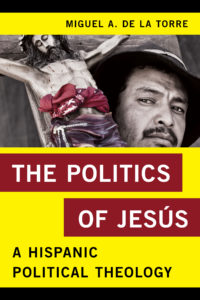Brazilian liberation theologian Carlos Alberto Libânio once said that Jesus wasn’t killed for speeding on a camel, but for challenging the religious and political establishments of his time. The accented Jesús presented by Miguel De La Torre also challenges the tamed Jesus of the dominant culture in America and is at odds with what De La Torre calls the Euroamerican Jesus. His Jesús is not consonant with versions of the white, middle-class, American dream that are usually based on capitalist commitments either endorsed or ignored by the Jesus of the establishment. At the center of De La Torre’s project is the articulation of a Christology that is compatible with the praxis of the liberation of the oppressed grounded on God’s preferential option for the poor as expressed decades ago by Latin American liberation theologians. De La Torre’s work is deeply rooted in the liberationist tradition and, as such, his presentation of a Hispanic Jesús emphasizes a concern for hermeneutics and praxis. His project of articulating Jesús has both a strong deconstructive element as he attempts to reject the Euroamerican Jesus, as well as a prescriptive element in his presentation of Jesús as the suitable replacement for the Jesus of the dominant culture.
De La Torre’s motivation for writing The Politics of Jesús is to demonstrate to critics of liberationist ethics that liberationist work is “deeply rooted in the Jesus story” (xiv). His stated goal is “to delineate a biography of Jesus as understood by marginalized Hispanics” (xiv). But De La Torre is not naïve when it comes to the risks of projecting one’s own dispositions onto the Jesus of the gospels—a mistake that, according to him, the interpreters of the Euroamerican Jesus commit repeatedly. His biography of Jesús is a theological one that is unapologetically contextual. In this sense, De La Torre’s work differs from Christologies that claim absolute objectivity and universality. It is De La Torre’s contextual awareness that allows him to reflect on how his own experience as a Hispanic in America and the experiences of millions of other Hispanics resonate with the biblical accounts of Jesus. The quest for the readers of The Politics of Jesús, therefore, is not one that attempts to find an absolutist interpretation of Jesus, but one that takes them on a journey toward identifying how the experiences of oppression among the disenfranchised map onto the major themes of Jesus’s life as preserved by the gospel accounts. In addition, this is not a book directed exclusively at Hispanics, but one that, from a Hispanic perspective, builds on the broader theme of the relationship between images of Christ, justice, discipleship, individual consciousness, and social structures.
De La Torre’s The Politics of Jesús is accessible to a wide range of readers. The language is clear, the argument straightforward, and the many anecdotes will keep readers engaged. The major contribution of the book lies in articulating a liberationist Christology that is accessible for people without formal theological training. In addition, The Politics of Jesús connects insights of liberationist Christologies to particular experiences of Hispanics in America, thus providing a welcome Christological perspective that relates to those on the margins of American society.
When it comes to theological construction, however, one is hard pressed to identify how De La Torre advances the insights developed by liberationists such as Leonardo Boff, Jon Sobrino, or Ignacio Ellacuria, whose Christologies remain the paradigm for liberationists.
In addition, the way in which De La Torre subordinates his understanding of an authentic appropriation of Jesús’s example to a struggle for structural, socio-economic justice fosters a particular theo-political emphasis that seems to overlook aspects of the life of Christ that are integral to the gospel narratives as they have been traditionally interpreted. John Howard Yoder’s ethics, for instance, emphasized aspects of Christ’s life and teaching that De La Torre does not thoroughly address such as forgiveness, humility, servanthood, radical subordination, and so on. Although an emphasis on such aspects may represent—as De La Torre seems to believe—a projection of Yoder’s own white, Mennonite dispositions onto the biblical text, the fact that De La Torre contrasts his work to Yoder’s in his introduction leaves readers wanting a more thorough engagement with Yoder’s reading of Jesus.
Finally, one wonders whether a sharp distinction between an orthodox understanding of Christ and De La Torre’s central call for incarnational identification with the oppressed is necessary or even productive. Perhaps a “big-tent” Jesús that would also include Hispanics who are concerned with the more mystical aspects of Christ’s life, death, and resurrection would be both more appealing to and representative of more Hispanics. Despite these potential limitations, The Politics of Jesús is a clear and concise work that provides an accessible introduction to the ethos of liberationist Christologies while dealing with aspects that are specific to the experience of disenfranchised Hispanics in the US.
Baylor University and Baptist University of the Américas




